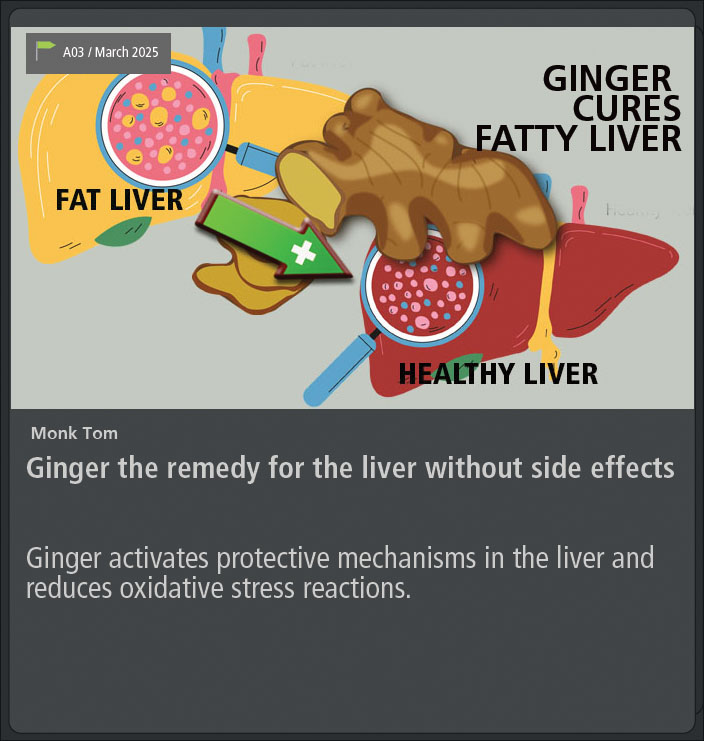GINGER CURES FATTY LIVER


By Monk Tom
Ginger the remedy for the liver without side effects
The liver is one of the most important organs in our body. It regulates metabolism, stores nutrients, produces bile for digestion, and breaks down harmful substances. However, when we burden our bodies with excessive alcohol consumption, the liver can no longer perform its tasks effectively – with serious consequences.
How Does Alcoholic Fatty Liver Develop?
When we consume alcohol, it is broken down in the liver. With moderate consumption, the liver can handle this process well. But with regular or excessive alcohol intake, the delicate balance is disrupted. During alcohol breakdown, toxic byproducts like acetaldehyde are produced, which can damage liver cells. As a result, the liver begins to store more fat – leading to alcoholic fatty liver .
This is the first stage of potential liver damage. Fortunately, this change is reversible in many cases: if individuals stop drinking alcohol early enough, the liver can regenerate on its own.
Progressive Damage:
From Hepatitis to Cirrhosis
Unfortunately, continued alcohol consumption leads to further damage. In the second stage, alcoholic hepatitis can develop – an inflammation of the liver that poses serious health risks. At this stage, chronic changes such as the formation of scar tissue (liver fibrosis) can occur.
The final stage is liver cirrhosis , where the liver becomes completely scarred and loses most of its functions. Alarmingly, many people do not notice symptoms in the early stages. Therefore, it is crucial to take action early.
Thresholds for Alcohol Consumption
• For men, the threshold is 20 grams of alcohol per day – equivalent to about one large glass of beer.
• In women, alcoholic liver disease can develop from as little as 10 grams of alcohol per day . Women are more susceptible due to their smaller body size and different metabolic processes.
New Hope:
The Role of Ginger-Derived Nanoparticles
Recently, scientists have discovered a promising approach to prevent alcohol-related liver damage: Ginger-Derived Nanoparticles (GDN) . These may help protect the liver from the harmful effects of alcohol. But what makes GDN so special?
Key Findings from Research
1. Protection Against Alcohol-Induced Liver Damage:
• Mice treated with GDN showed significantly less liver damage compared to untreated animals.
• GDN reduced fat accumulation in the liver (liver triglycerides) and lowered blood levels of liver damage markers (ALT and AST).
• Histological examinations confirmed fewer inflammations and fatty liver.
2. Mechanism of Action:
• GDN activate the transcription factor Nrf2 , which regulates antioxidant and detoxifying genes. This helps reduce oxidative stress and inflammation.
• A specific component of GDN, Shogaol , plays a central role in this process.
3. Targeted Effect:
• GDN accumulate selectively in the liver and are absorbed by hepatocytes (liver cells). This minimizes side effects.
4. Reduction of Oxidative Stress Reactions:
• GDN decrease the production of reactive oxygen species (ROS) , which are a major cause of alcohol-related liver damage.
Can Ginger "Cure" Liver Damage?
Studies show that GDN primarily work preventively. They protect the liver from damage when used alongside alcohol consumption. However, it remains unclear whether they can reverse existing liver damage.
Limitations and Open Questions
1. Preventive vs. Therapeutic Effect:
• Most studies examine the preventive effects of GDN. It is unclear whether they can help in advanced conditions like cirrhosis.
2. Relevance to Humans:
• The results come from animal studies. Further clinical trials in humans are needed to confirm the efficacy and safety of GDN.
3. Dosage and Application:
• The doses used in the studies were relatively high and may not be directly comparable to consuming fresh ginger. The optimal dosage and form of administration still need to be researched for medical applications.
Practical Tips for Liver Health
1. Reduce Your Alcohol Consumption:
• Stick to the recommended limits: a maximum of 20 grams of alcohol per day for men and 10 grams for women.
• Regular alcohol-free days give the liver time to regenerate.
2. Eat a Healthy Diet:
• A balanced diet rich in fruits, vegetables, and whole grains supports liver health.
• Avoid fatty and highly processed foods.
3. Incorporate Ginger into Your Diet:
• Ginger can be enjoyed as tea, spice, or smoothie ingredient. However, keep in mind that consuming fresh ginger does not have the same effect as GDN.
4. Exercise Regularly:
• Physical activity boosts metabolism and helps break down excess fat in the liver.
Conclusion:
Ginger the remedy without side effects for the liver
Ginger provides a promising approach to prevent or mitigate alcohol-induced liver damage. Ginger activates protective mechanisms in the liver and reduces oxidative stress reactions.
